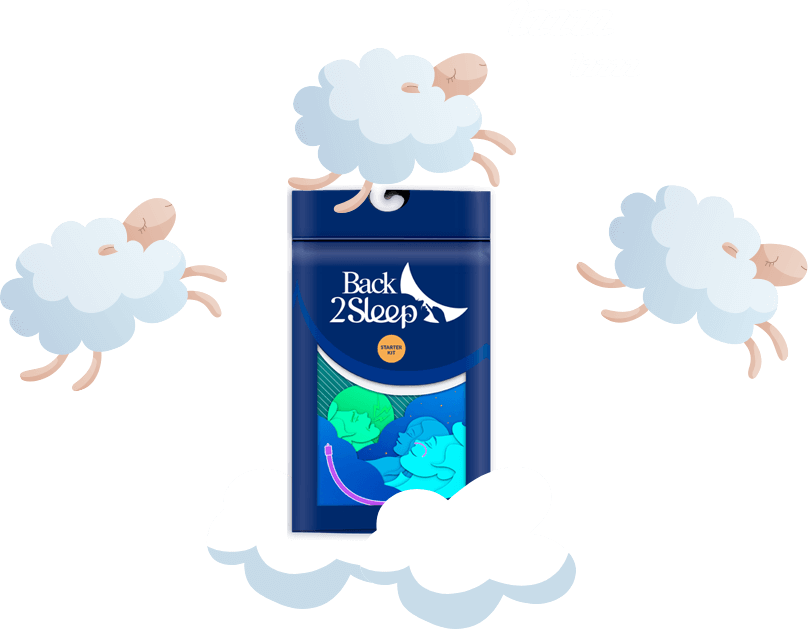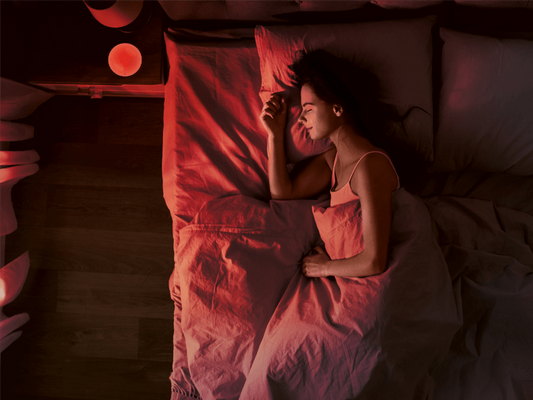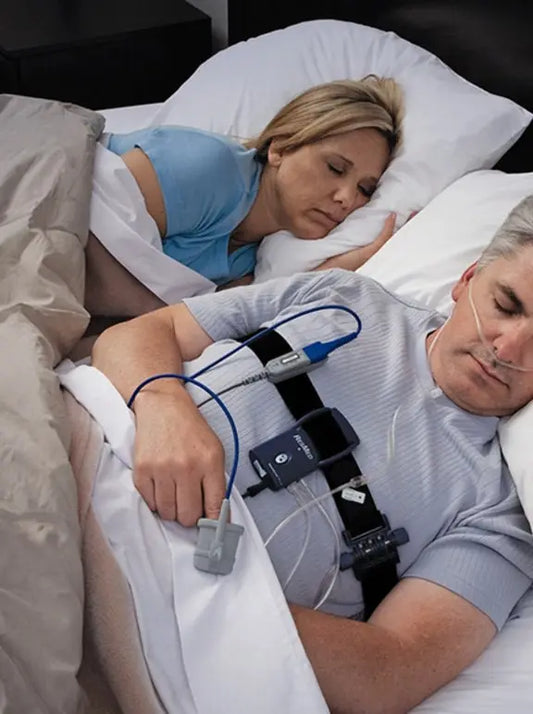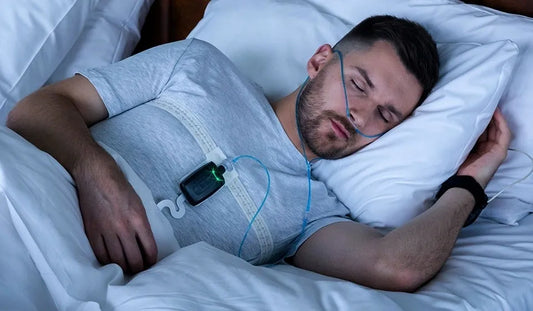Turn your nights into a haven of peace with effective anti-snoring tips.
Identifying the cause is crucial: it can range from nasal obstruction to lifestyle habits such as being overweight.
Fortunately, there are solutions, such as adjusting the sleeping position to specialized devices.
With patience and the right advice, saying goodbye to snoring and hello to peaceful nights is within your reach.
What is snoring and why is it a problem?
Snoring isn't just an annoying noise; it's a warning signal for your health.
Let's take a closer look at this phenomenon and its repercussions.
Snoring occurs when the flow of air through the respiratory tract is partially obstructed during sleep.
This obstruction can be caused by a variety of factors, from slackening of the tissues in the throat to a poor sleeping position, causing a sound vibration when breathing.
💊But why is that a problem?
Beyond the discomfort for those around you, snoring can indicate more serious disorders, such as sleep apnea which affects sleep quality and, by extension, overall health.
Studies show that snoring can increase the risk of cardiovascular disease, hypertension and daytime sleepiness.
Ignoring snoring means neglecting a crucial aspect of your well-being.
💊What are the common causes of snoring?
The main causes of snoring include:
- overweight,
- alcohol consumption before bedtime,
- allergies,
- and respiratory disorders such as sleep apnea.
📌 Excess weight can reduce the diameter of the airways, making it harder for air to pass through freely, especially if fat accumulates around the neck.
📌 Alcohol relaxes the throat muscles, making them easier to block.
📌 Allergies can cause nasal congestion, forcing you to breathe through your mouth and contributing to snoring.
📌 Structural problems such as a deviated septum or enlarged tonsils may also be involved.
💊What impact does snoring have on health?
Chronic snoring is not to be taken lightly.
It can be a harbinger of sleep apnea, a condition where breathing stops and starts again during sleep, leading to unrefreshing rest and an increased risk of cardiovascular conditions.
What's more, lack of sleep due to snoring can lead to daytime sleepiness, reducing quality of life and increasing the risk of accidents.
Snoring can also cause tension in relationships, with a sleeping partner often disturbed by the noise.
By understanding and treating snoring, you can not only improve your sleep but also protect your long-term health.
The first simple tips against snoring?
Easy-to-implement solutions for quieter nights.
Let's see how a few adjustments can make all the difference.
For many, snoring is a frustrating nocturnal problem, but there are simple tricks to mitigate its effects.
Starting with changes in your sleep routine can have a significant impact.
📌 For example, sleeping on your side rather than on your back can prevent your tongue from blocking the passage of air, thus reducing snoring.
📌 Avoiding heavy foods, alcohol and sedatives before bedtime can also reduce the chances of snoring, as they relax the throat muscles, making it easier to obstruct the airways.
📌 Another tip: raise the headboard a few centimetres. This helps keep the airway open by preventing the tongue and palate from falling back into the throat.
📌 Pillows specially designed for snorers can also offer a solution by supporting the neck and encouraging breathing through the nose rather than the mouth.
📌 Finally, maintaining good sleep hygiene by going to bed and getting up at regular times contributes to better quality sleep, which in turn can reduce snoring.
💊Adopt a change in lifestyle?
Adopting a healthy lifestyle plays a crucial role in reducing snoring.
📌 Weight management is essential, as excess weight increases the risk of snoring by adding pressure to the airways.
📌 Regular exercise not only helps maintain a healthy weight, but also improves overall muscle tone, including that of the throat muscles, thus reducing snoring.
📌 Cutting down or quitting smoking can also help reduce snoring, as tobacco irritates the mucous membranes, causing airway swelling and obstruction that promotes snoring.
💊What are natural sleep aids?
Natural remedies can be a great help for those looking to reduce their snoring.
From relaxation techniques such as meditation and yoga can improve sleep quality and reduce stress, which is often a contributing factor to snoring.
Using essential oils such as eucalyptus or peppermint can help clear nasal passages before bedtime.
Devices such as nasal strips or nasal dilators can facilitate breathing by widening the nostrils, thus reducing snoring.
These simple solutions, combined with lifestyle changes, offer an effective way to combat snoring without immediately resorting to more drastic measures.
Medical treatments for snoring?
Advanced medical solutions for peaceful nights.
When it comes to snoring, sometimes simple anti-snoring tricks just aren't enough, especially in severe cases linked to disorders such as sleep apnea.
That's where medical treatments come in, offering solutions ranging from CPAP (Continuous Positive Airway Pressure) to surgical interventions.
CPAP machines are often prescribed for obstructive sleep apnea, keeping the airways open during the night with a constant flow of air.
However, for those who find CPAP uncomfortable or ineffective, surgical options such as uvulopalatopharyngoplasty (UPPP), which removes or tightens pharyngeal tissue to widen the airway, can be explored.
These interventions target the physical causes of snoring, offering a more radical and lasting solution for those who suffer from it.
How do you choose the right solution for you?
Finding the key to a peaceful night's sleep starts with understanding your needs.
Choosing the right anti-snoring solution depends largely on the underlying cause and severity of your snoring.
📌 Start by assessing your situation:
- Is it just occasional light snoring or is it linked to sleep apnea, a more serious condition?
Your choice should also consider your lifestyle and personal preferences.
Solutions range from simple lifestyle adjustments, such as changing your sleeping position or using special pillows, to more advanced interventions such as CPAP machines or even surgery.
It's essential to weigh up the pros and cons of each option, and sometimes a combination of treatments is the best way forward.
Don't underestimate the importance of consulting a specialist for a precise diagnosis and personalized advice.
💊How to make an initial snoring self-evaluation?
📌 Learn how to assess your snoring.
Self-assessment is a crucial first step in understanding the severity of your snoring.
Please note:
- frequency,
- duration,
- and if nocturnal awakenings or daytime sleepiness are present.
📌 Sleep tracking apps can help you collect precise data on your sleep habits.
However, it's important to recognize the signs indicating when it's time to consult a specialist, especially if your snoring is accompanied by pauses in breathing, wasting or suffocation during sleep.
💊When to consult a sleep specialist?
Consulting a sleep specialist is essential for those who suspect they suffer from sleep apnea or other nocturnal breathing disorders.
A professional may recommend a polysomnograph, a sleep test that measures respiratory activity and oxygen levels.
This precise assessment enables us to determine the best personalized solution, whether this involves surgery, the use of a CPAP device, or other medical treatments.
The specialist can also guide you towards lifestyle adjustments that complement the chosen treatment, ensuring a holistic approach to combating snoring.
The Back2Sleep solution, the intranasal orthosis
A revolution in the fight against snoring.
The intranasal orthosis made by Back2Sleep represents a significant advance in the non-invasive treatment of snoring.
Designed to offer a comfortable and effective alternative to traditional solutions, this brace works by gently opening the nasal passages, making breathing easier and reducing the frequency and intensity of snoring.
Its innovative design adapts to the shape of each nostril, guaranteeing not only a reduction in snoring, but also an overall improvement in sleep quality for the snorer and his or her partner.
Easy to use and with no side-effects, the Back2Sleep orthosis is a promising solution for those looking to get a good night's sleep without resorting to more radical interventions.
💊Benefits and use
The advantages of the Back2Sleep intranasal orthosis are many, ranging from ease of use to proven efficacy, with many testimonials from satisfied users.
Regular use can significantly reduce snoring by improving airflow, leading to deeper, more restful sleep.
For optimum use, simply insert the brace into the nostrils before bedtime - a simple, non-binding solution to snoring.
💊Where can I get it?
Buying the Back2Sleep intranasal orthosis couldn't be easier: go directly to the official website.
You'll find all the information you need to make your purchase with complete confidence, as well as advice on how to maximize the benefits of this innovative device.
Frequently asked questions about anti-snoring tips
💊Q. Can changing pillows help snoring?
Changing pillows can actually help against snoring, especially if the pillow is designed to improve sleeping posture.
A suitable pillow can keep the head and neck in a position that allows air to pass more freely, thus reducing snoring.
For people who sleep on their backs and are prone to snoring, a firmer pillow or one designed to slightly elevate the head can prevent airway blockage.
Memory foam pillows are particularly recommended as they adapt to the shape of the head and neck, providing optimum support and reducing the likelihood of snoring.
💊Q. Are sleep tracking apps useful for managing snoring?
Sleep tracking apps can be useful for managing snoring, providing valuable data on your sleep patterns.
They can be used to detect snoring patterns and identify factors that may aggravate snoring, such as sleeping positions or times of night when snoring is most intense.
However, their usefulness is limited without concrete action. These applications are particularly effective when used in combination with other treatment methods, such as changing sleep position or using nasal orthoses.
They offer insight into the quality of your sleep, enabling you to adapt your night-time routine to minimize snoring.

- Al seleccionar una opción, se actualiza toda la página.
- Se abre en una nueva ventana.







